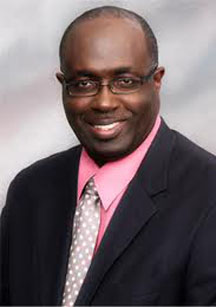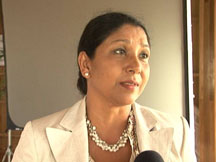The 44th Annual General Assembly of the Caribbean Broadcasting Union (CBU) from August 19-22 concluded here with the re-election of Shida Bolai as President and saw concerns ventilated about the cost of the digital switchover.
A release from the Govern-ment Information Agency (GINA) quoted Gary Allen, the newly elected Vice-President, at a press briefing at the Guyana International Conference Centre (GICC) Liliendaal as saying, “Out of that it became very clear to us that across the Caribbean, digital switchover is going to cost tens of millions of dollars per territory… with (the)


level of investment that is expected we had an assessment of what new services and new revenue streams are likely to come on stream, and we are very concerned that those persons who have already done digital switch-over as well as integrators themselves, did not have very good news for us about proven, possible new revenue streams that we can look forward to.”
During the conference, the members heard presentations from a number manufacturers and representatives from the American and European Standards regulating bodies.
Allen added that if the timelines that some of the regulators spoke of are facilitated, then this may lead to significant dislocation of the television media sector at both the business and consumer levels because “at the business level, we do not have the kind of absorptive capacity to fund the kind of investment that is needed.”
According the GINA, since none of the jurisdictions that are yet to make the transition can afford to fund this investment from their operations, then it is likely that debt will have to be incurred which will lead to a reduction of profitability for the organisations.
The switch from analogue to digital commenced June 17, 2006 and the deadline for completion is June 17, 2015. It was pointed out that only the United States and a few European countries have completed this process. Several Caribbean countries, including Guyana, are still to make this transition.
The CBU recognised that focus also needs to be placed on public awareness, to give consumers enough time to find funds to purchase new television sets.
The CBU called on policymakers in the region and regulators to engage broadcasters meaningfully to develop a workable plan within a certain timeframe to aid in the successful transition from analog to digital media.
GINA said that Bolai confirmed that the CBU was able to accomplish a lot at this conference including two days of virtual sessions with the largest contingent of participants located throughout the Caribbean, and the election of a new board.
She said that in the future, the work of the CBU will include a comprehensive review of its membership and its bylaws (to make them more relevant in light of technological changes).
CBU Secretary General, Patrick Cozier described this conference as one of the most engaging and well-planned, and commended the organisers and the government of Guyana.
Cozier said with the changing media landscape, broadcasters must be reminded it is more important to be accurate than first. He added that, “an informed citizenry is the gatekeeper of a progressive democracy.”
GINA said that concern was also raised about access to West Indies Cricket. It said that broadcasters in the region have been complaining about a trend whereby some regional cricket properties no longer had facilities available for broadcasters to carry live coverage. In this regard, the CBU resolved to discuss with the West Indies Cricket Board possible solutions.
The CBU was formed in 1970 with the aim of stimulating the flow of broadcast material among the Radio and Television systems in the Caribbean region.
GINA reported that the new board members include the Vice President, Gary Allen from Jamaica; Acting CEO of the National Communications Network (NCN), Michael Gordon; Pulita Olivieri from St. Vincent and the Grena-dines; Beulah Jonas from St. Maarten; Edwin Lightbourne from The Bahamas; a representative from Starcom Network in Barbados and representatives from Belize and Suriname.




